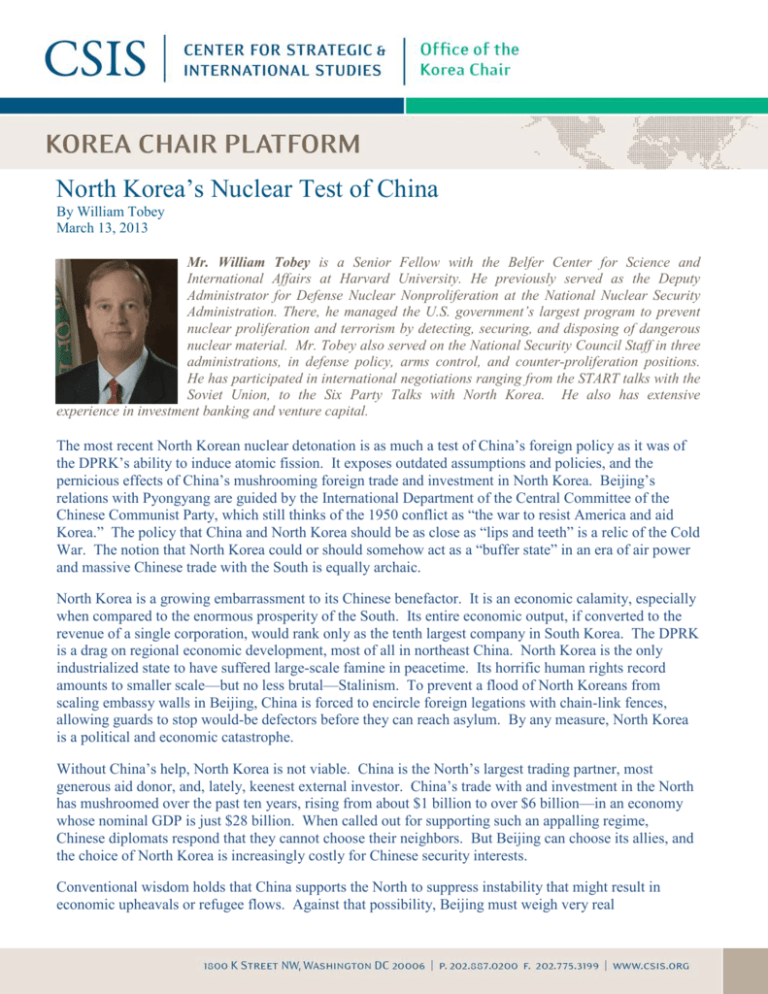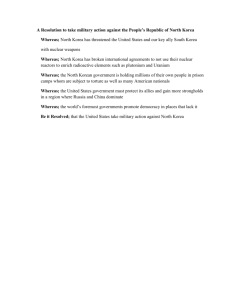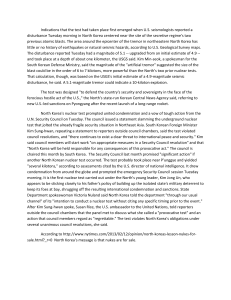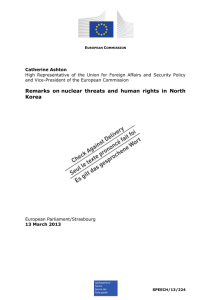PDF file of "North Korea's Nuclear Test of China"
advertisement

North Korea’s Nuclear Test of China By William Tobey March 13, 2013 Mr. William Tobey is a Senior Fellow with the Belfer Center for Science and International Affairs at Harvard University. He previously served as the Deputy Administrator for Defense Nuclear Nonproliferation at the National Nuclear Security Administration. There, he managed the U.S. government’s largest program to prevent nuclear proliferation and terrorism by detecting, securing, and disposing of dangerous nuclear material. Mr. Tobey also served on the National Security Council Staff in three administrations, in defense policy, arms control, and counter-proliferation positions. He has participated in international negotiations ranging from the START talks with the Soviet Union, to the Six Party Talks with North Korea. He also has extensive experience in investment banking and venture capital. The most recent North Korean nuclear detonation is as much a test of China’s foreign policy as it was of the DPRK’s ability to induce atomic fission. It exposes outdated assumptions and policies, and the pernicious effects of China’s mushrooming foreign trade and investment in North Korea. Beijing’s relations with Pyongyang are guided by the International Department of the Central Committee of the Chinese Communist Party, which still thinks of the 1950 conflict as “the war to resist America and aid Korea.” The policy that China and North Korea should be as close as “lips and teeth” is a relic of the Cold War. The notion that North Korea could or should somehow act as a “buffer state” in an era of air power and massive Chinese trade with the South is equally archaic. North Korea is a growing embarrassment to its Chinese benefactor. It is an economic calamity, especially when compared to the enormous prosperity of the South. Its entire economic output, if converted to the revenue of a single corporation, would rank only as the tenth largest company in South Korea. The DPRK is a drag on regional economic development, most of all in northeast China. North Korea is the only industrialized state to have suffered large-scale famine in peacetime. Its horrific human rights record amounts to smaller scale—but no less brutal—Stalinism. To prevent a flood of North Koreans from scaling embassy walls in Beijing, China is forced to encircle foreign legations with chain-link fences, allowing guards to stop would-be defectors before they can reach asylum. By any measure, North Korea is a political and economic catastrophe. Without China’s help, North Korea is not viable. China is the North’s largest trading partner, most generous aid donor, and, lately, keenest external investor. China’s trade with and investment in the North has mushroomed over the past ten years, rising from about $1 billion to over $6 billion—in an economy whose nominal GDP is just $28 billion. When called out for supporting such an appalling regime, Chinese diplomats respond that they cannot choose their neighbors. But Beijing can choose its allies, and the choice of North Korea is increasingly costly for Chinese security interests. Conventional wisdom holds that China supports the North to suppress instability that might result in economic upheavals or refugee flows. Against that possibility, Beijing must weigh very real consequences for its stated security goals. North Korea’s policies: • draw the United States and its Korean and Japanese allies closer together; • bolster U.S. and allied commitments to missile defenses, affecting China’s military capabilities as well as North Korea’s; • increase the salience of nuclear weapons, particularly extended deterrence; • make the continued presence of U.S. forces on the Korean Peninsula more rather than less likely; and, • create the very instability that China fears, in the form of cross border artillery attacks, naval warfare, and threats to end the Armistice. Beijing claims to have chosen stability over progress. In the end, it may have neither. The latest North Korean nuclear test affords China an opportunity to break with the past. Beijing can think strategically and affirm its relationship with trading partners whose combined economies are roughly a thousand times larger than North Korea’s. It can base its policies on future opportunities, not Cold War alliances and assumptions. It can seek modern security arrangements, rather than the false protection of a buffer state. It can make clear to the North that it will no longer support policies that are antithetical to Chinese security interests and will no longer prop up the North’s failed economic and dangerous foreign policies. Such a shift would go well beyond simply supporting ritual UN Security Council sanctions in response to the North’s provocations. Beijing’s choices can be made easier. Together with Seoul, Washington could offer specific assurances that the United States would not seek military advantage from the peaceful reunification of the Korean Peninsula, were that to occur at some future date, e.g. that there would be no need to base U.S. forces north of their current posts, and indeed that U.S. ground forces would be reduced in such an event. Seoul might assure Beijing that investment and trade would continue to be welcomed, and would expand. Each of the countries in northeast Asia might make clear to Beijing that they do not seek a Cold War bloc containing China, but rather a vibrant system of bilateral relationships enhancing the security and prosperity of the region as a whole. China’s relationship with North Korea has become an embarrassing anachronism. It is inconsistent with China’s rise as a responsible and great power. It is time to put aside support for a failed and dangerous state. Such a shift will not be undertaken lightly or abruptly, and change in North Korea should not be expected overnight, but it is important to start with the strategic recognition by Beijing that the status quo cannot hold. This is the true North Korean nuclear test. The Korea Chair Platform is made possible by the generous support of Samsung Electronics America. The views expressed in the Platform do not necessarily reflect those of Samsung Electronics America or of CSIS. The Office of the Korea Chair invites essays for consideration for the Platform. For inquiries, please email KoreaChair@CSIS.org. The Korea Chair Platform is published by the Office of the Korea Chair (http://www.csis.org/program/koreachair) at the Center for Strategic and International Studies (CSIS), a private, tax-exempt institution focusing on international public policy issues. Its research is nonpartisan and nonproprietary. CSIS does not take specific policy positions. Accordingly, all views, positions, and conclusions expressed in this publication should be understood to be solely those of the author(s).








